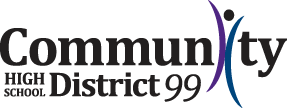Energy Conservation at D99
See also Go Green! Sustainability at CSD99
District 99 is committed to ensuring energy conservation and environmental awareness. Both are important not only to the future of our students, but also to being fiscally responsible to our taxpayers.
As a sign of our commitment to energy management, in 2002 District 99 established an energy management program. From developing awareness programs for staff and students to writing grants to secure additional funding from private sources, our energy management program efforts have helped the district to save $3.6 million since April 2008.
Program Benefits:
- Budget - dollars are retained for educational purposes
- Environmental - Conservation of natural resources
- Self-funding program - Conservation activities generate savings which more than pay for the program
- Longevity - Program designed to be ongoing
Read more about our program in our update to the Board of Education in June 2015.
Energy Efficient Practices
Faculty, staff and students are all involved in the effort to conserve energy at District 99. The most important way we have reduced our energy usage is by changing our behavior. Saving energy has become second nature for all of us at District 99 by:
- Switching off the lights when classrooms, offices and restrooms are not in use;
- Powering off computers, unplugging appliances, and closing windows and doors before long weekends and holidays;
- Recycling paper and plastic in one of the 400+ bins throughout our three facilities;
- Consolidating the use of small appliances, such as coffee pots, microwaves, refrigerators; and
- Using "green," environmentally-friendly cleaning supplies.
Energy Efficient Facilities
Over the years, District 99 has enacted fundamental changes to our environments in order to better align our buildings to our conservation efforts. Highlights of our initiatives include:
- Switching from T12 fluorescent light bulbs/ballasts to T8 light bulbs in classrooms and offices;
- Installing covers on swimming pools at both schools, which reduced the heating costs by 28 percent— saving $19,000 per pool, per year in heating costs. It also reduced each pool’s annual water consumption by 38 percent (or 108,500 gallons per pool);
- Removing or disabling lights on vending machines;
- Regularly reviewing energy conservation options with architects and electrical engineers, which may soon result in retrofitting lights in our gymnasiums and parking lots to take advantage of more energy efficient options;
- Evaluating and installing new HVAC and electrical equipment for energy efficiency and sustainable functionality and operation. In fact, only energy service companies (ESCO’s) were permitted to bid on our HVAC capital improvement projects. ESCO’s are capable of auditing our buildings to identify energy conservation measures within the scope of work, and offer guaranteed savings through performance contracts.
- Calculating a total return on investment by analyzing the cost of upgrades to the total payback savings over time.
- High efficient dehumidification units have been installed in both natatoriums.
- LED lighting has been installed in large and small gymnasiums.
Current Initiatives
We have had the following successes and continue to actively pursue grant opportunities:
- The Illinois Clean Energy Community Foundation (ICEF) was established in December 1999 as an independent foundation with a $225 million endowment provided by Commonwealth Edison. The Foundation exists to improve energy efficiency, advance the development of renewable energy resources and protect natural areas for people in communities all across Illinois. We were awarded $80,000 to complete a standard lighting retrofit from T12 to T8 fluorescents (bulbs and ballasts). That work was completed using in-house labor which saved us even more.
- We submitted an application for a $250,000 School Energy Efficiency Project Grant from the Illinois State Board of Education in January. That application is pending approval. That money would help to offset the cost of heating and cooling plant renovations.
- We are investigating the possibility of upgrading the lighting in the remaining areas of the buildings that were not covered by the ICEF Grant. There is grant money available from the Department of Commerce and Economic Opportunity’s Public Sector Electric Efficiency Program.
- We monitor the Database of State Incentives for Renewables and Efficiency regularly for grant opportunities.
- Our involvement with Energy Education, Inc. provides timely notice of grant opportunities from both the public and private sectors as they become available.
- In 2016, new boilers were installed at North High School. District 99 received a grant for $180,000.00 from the Department of Commerce and Economic Opportunity (DCEO) for the new boilers.
- In 2016, District 99 received a $7,000.00 grant from Department of Commerce and Economic Opportunity (DCEO) for a solar panel installation at South High School.
